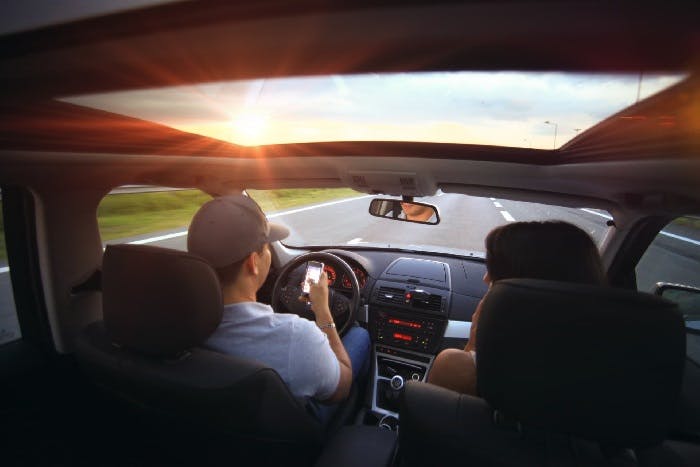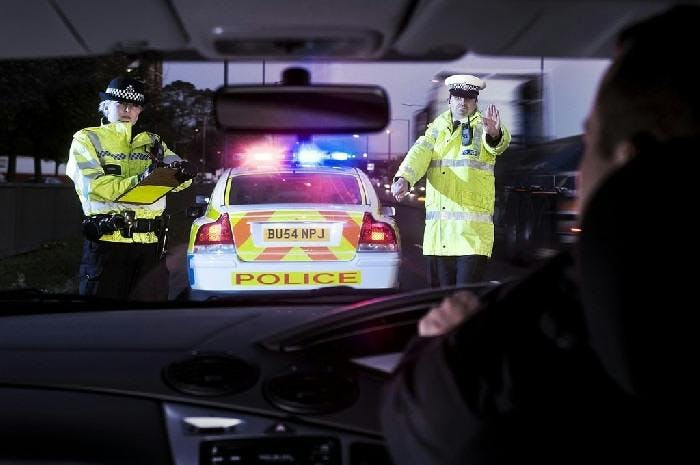
For many of us, mobile phones almost serve as an extra limb. We spend numerous hours a day scrolling, updating and chatting with the help of our trusty smartphone sidekicks. In fact, we have become so reliant on them that the anxiety when we're without our phone has got its own name — nomophobia.
This intense relationship with our phones is very problematic when it comes to driving. Studies have shown that using your mobile phone in the car can increase reaction time more than alcohol. It's no surprise, then, that the number of road accidents caused by drivers being distracted by their phones is rising.
Despite this, smart-phoning while driving does not carry the same stigma as drink-driving and this makes it hard to combat. It doesn't help that many of the functions our phones provide (music, maps, clock... etc.) are often useful when driving. Nevertheless, using your phone in the car could cost you money, points on your licence and even your life.
To shed some light on this increasingly salient issue, let's delve a little further into the risks and realities surrounding phones and road safety...
The Law

Hand-held
The main thing to remember about mobile phones and driving is that using a handheld device at any point (even in stationary traffic) is against the law. This means no calling, texting, mapping, song-choosing or (God forbid) Snapchatting. It is also illegal to use one when supervising a learner driver.
There are just 2 situations you're allowed to hold and use a phone while behind the wheel: if it is an emergency and it is impossible to safely park before making a call, and when making a contactless payment while the vehicle is stationary (at a drive-thru, for example).
The penalties for using handheld devices got stricter this year, with initial fines rising from £100 to £200 (they can start from an eye-watering £1000 if you are taken to court). In addition, your licence will now be slapped with 6 points, rather than 3. This means that if you have been driving for 2 years or less, you will lose your licence if caught using your phone on the road. Think twice, new drivers!
Hands-free
An area that seems a little grey to many is laws surrounding the use of hands-free devices. Many new cars and phones provide this option, or you can purchase equipment that makes it possible. The law states that using a hands-free phone while driving is legal. This is as long as you do not touch the device at any point—so you need to set your phone up in a cradle before you start driving. If you're judged not to be in full control of your vehicle (regardless of hands-free use) you can be penalised as police see fit.
Of course, if you cause an accident when using your phone, you face a driving ban and prison time. All things considered, we'd leave the phone on silent, or better yet, off!
Consequences

It's very easy to get cavalier about using your phone whilst driving. If you're familiar with a particular route it can become repetitive, making you feel overconfident in your ability to multitask while driving. The issue is that even if the road itself is the same, the people, vehicles and conditions are constantly changing.
Using your phone takes your eyes off the road, increases reaction time and makes you less likely to notice hazards. As many of you will know from your hazard perception test, clocking potential hazards early is key to avoiding accidents.
In 2015 distraction by mobile phone was the main cause of 22 fatalities on Britain's roads. This rose to 32 fatalities in 2016, with phones being the major factor in 478 accidents overall that year. As the number of casualties from this problem steadily rise, police are taking it very seriously. The issue is also getting a lot of media coverage, with stories of dangerous taxi drivers and tragic road deaths due to phone use making headlines.
New rules introduced in 2022
Technology moves fast, so the law needs to make sure it's not far behind. In 2022, further changes were made to the amend the 1986 Regulations which now means any driver holding and using a device behind the wheel is breaking the law.
'Holding and using a phone' now includes:
- Illuminating the screen
- Checking the time
- Checking notifications
- Unlocking the device
- Making, receiving, or rejecting a telephone or internet-based call
- Sending, receiving or uploading oral or written content
- Sending, receiving or uploading a photo or video
- Utilising camera, video, or sound recording
- Drafting any text
- Accessing any stored data such as documents, books, audio files, photos, videos, films, playlists, notes or messages
- Accessing an app
- Accessing the internet
Using Your Mobile Phone in the Car

So, what can YOU do to avoid being part of this problem?
- Follow Think!'s advice and "make the glove compartment the phone compartment"—when was the last time you used it for gloves anyway?!
- Download apps like Agent or Lifesaver. They detect when you're driving and respond to messages, letting people know you're currently unavailable. Some even have features that read out texts for you! Explore what's on the market; it's constantly updated with software that's both handy and fun to use. Apple have also recently introduced a Do Not Disturb feature for their phones.
- If waiting on a vital call, either request that it take place after you reach your destination or don't drive until it's done and dusted.
- If using a hands-free device and the conversation gets heated, pull-over safely to continue it or end the call.
- Ideally, switch your phone off when you get in the car, or at least put it on silent.
Phones have become such an integral part of our daily lives that some of this advice may seem slightly OTT. Then again, no phone call or text is worth risking your life for. And as for Snapchat: yes, those dog ears look adorable on you, but the picture can wait. If you're finding it really hard to kick the habit, check out our top 5 tips to avoid using your phone while driving.
And remember: if you're accompanying a driver, either as an instructor or as a friend or family member, these rules apply to you too.
Smartphones and cars are both incredibly useful and a lot of fun—but they should not mix!
FAQs: Mobile phone car rules
Can you use a mobile phone in a car?
The rule to remember is that you cannot touch your phone at any point while you are driving. This means that you can technically use a hands-free device while you drive, as long as everything is set up before you turn the engine on. We still advise that you only do this if the call is absolutely necessary.
Is using your phone as a sat nav illegal?
No, as long as you turn it on and enter the desired location before you start driving. Again, you cannot touch the phone itself at any point while you are driving. This includes if you are in stationary traffic.
Should I buy a sat nav or use my phone?
It's really up to you and your budget. You might find that having a sat nav takes away the temptation to use your phone while driving because you can put it away completely if you are not using it for directions. If you're thinking about purchasing a sat nav, take a look at our top 10 budget sat navs.
Can passengers in cars use their mobile phone?
It is perfectly acceptable for passengers to use their mobile phone in the car, as long as they do not pass it to the driver or require the driver to touch the phone at any point. Passengers supervising learner drivers, however, cannot use a mobile phone while the car is running.
Is it illegal to have your phone mounted in your car?
No. Car phone holders allow you to use your mobile phone in the car without having to touch it.
For more advice about driving law, why not take a look at this article about driving in the UK with an EU licence?
Subscribe for driving advice, offers & more
We'd love to let you know about our courses, news and offers via email. You may unsubscribe at any time.
Star Genie Limited trading as PassMeFast. Company number 10093359
Copyright © 2024 owned by Star Genie Limited
PassMeFast, Blue Tower, MediaCityUK, Salford, M50 2ST
